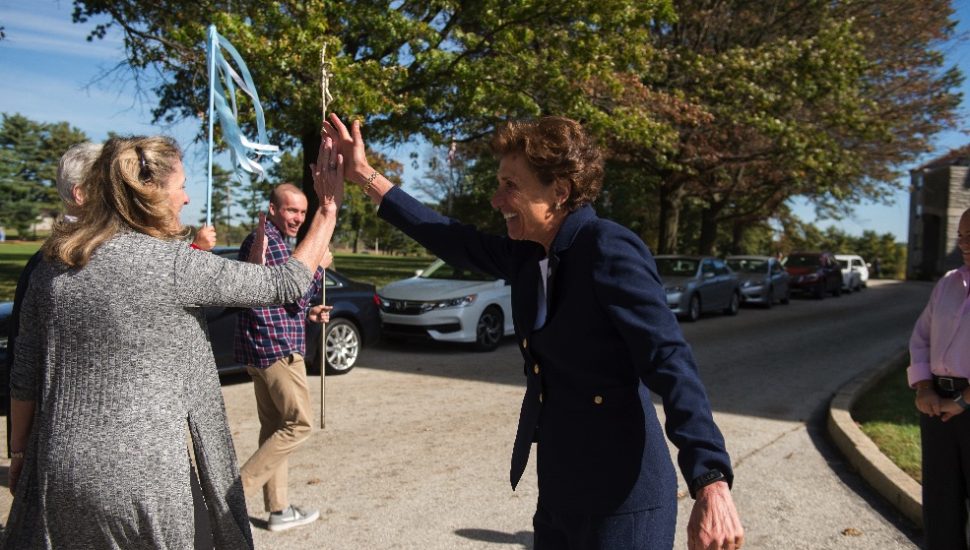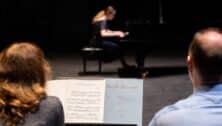Chester County Leadership: Barbara Lettiere, President, Immaculata University

 Barbara Lettiere, the President of Immaculata University, spoke with VISTA Today about growing up in New Jersey, what she learned at her first job, and why she decided to attend Immaculata as an undergrad and Notre Dame as a graduate student.
Barbara Lettiere, the President of Immaculata University, spoke with VISTA Today about growing up in New Jersey, what she learned at her first job, and why she decided to attend Immaculata as an undergrad and Notre Dame as a graduate student.
She also discussed her return to Immaculata, where she has been for 18 months now, and what opportunities lie ahead for the university, which will soon be celebrating its centennial.
Where were you born, Barbara, and where did you grow up?
I was born the oldest of two children and grew up in Trenton, New Jersey.
What did your parents do?
My dad drove a laundry truck, and my mother was a clerk for a small refrigeration company.
What do you remember about growing up in Trenton?
What sticks out the most is the fact that everyone in the neighborhood I lived in was Italian. Most of the community were immigrants and spoke Italian as their first language. My brother, who was a year younger than me, and I spoke Italian before we could speak English.
All my aunts and uncles lived close by. My grandmother lived with us, and she was a first-generation immigrant. I still remember the day she became of US citizen. She could only speak Italian, but she could understand English, which always made for a fun time in our household especially when I had friends visit.
Did you play any sports when you were younger?
I did, but nothing organized because there was nothing like that for girls in those days. There was a schoolyard down the street, so we would go there and play stickball. There was one other girl with me, and we would always play with the boys. I think I held my own because they always asked me to come back.
My dad won a tennis racket for me at the church bazaar, so I picked up tennis as a hobby and would go hit the ball off the wall at the schoolyard. Tennis was my favorite sport. I went to an inner-city high school , and the only organized sport they had for girls was basketball. I did not play tennis in high school, but I was a walk-on at Immaculata. The coach had me play doubles.
What was your first job, Barbara?
My first job was with the Department of Transportation, which was headquartered in New Jersey. I had an aunt who worked there, and she was able to get my brother and I summer jobs. I started there as a filing clerk when I was 16. It was awful!
What life lessons did you take from that filing job?
I learned two things from that job that summer: the value of hard work and the importance of an education. After that experience, I knew I needed to get a good education because I was not going to file for the rest of my life.
What did you want to be in high school?
I did not know. My parents did not go to college , so they emphasized the importance of my education. My mother wanted me to be a lawyer and my father thought I should be a doctor. I was interested in neither. What was important to my Mom was that I get a college degree. She was way ahead of her time. She was the type that believed if my brother could do it, so could I. She grew up with a brother who was able to do things that she was not able to, so she did not let that happen with me.
What kind of music were you listening to in high school in college?
In college, the music of the time was hard/acid rock. I could never get into it. At the same time, Carol King, James Taylor, Simon & Garfunkel were big, so I listened to that. I liked that genre and listened to that instead.
My parents didn’t have two nickels to rub together, but they insisted that we learn music. My brother and I took piano lessons for 5- 7 years. We were trained in classical music, so the acid rock genre was not for me! Someday I would like to go back to playing the piano or some other instrument.
Being such a good student, you could have gone anywhere. Why did you choose Immaculata?
My options were limited because my dad did not want me to take out student loans. The price point of tuition was very important in my decision-making process. I was able to get some scholarship money from Immaculata, so that was a selling point. I was only about an hour from home, which was important for my mom. She liked how close it was, and she also liked the Sisters being there in force! I, on the other hand, was afraid of the Sisters I met on the campus visit. I have since gotten over my fears!
I do not regret that decision at all. Immaculata is an incredible institution, and it is about to celebrate its 100th year!
Did you always know that about Immaculata?
It took me until my junior year to recognize what a special place Immaculata is. I went to school to be a math major, but I wasn’t sure what I was going to do with it. I am more of a practical, quantitative type so I couldn’t see myself as an English, History, or Pre-Med major.
The first two years at Immaculata were tough, and I struggled. In my junior year, I took an economics course, and the light bulb went off; everything clicked.
Who gave you your first big break?
There was an Economics professor here at Immaculata who knew I liked the subject matter and wanted to continue studying it in graduate school. He knew some professors at the University of Notre Dame, and that’s where I went for my master’s degree.
What did he see in you, Barbara?
I think he saw my energy, passion, and ability to get things done.
What did you do after you finished your Master’s degree?
Right after I graduated from Notre Dame, I went to work for the “telephone company”. I worked out of a garage in North Philadelphia. I was the first woman in the outside plant department. I grew up quickly in this role. I’m not sure what they were thinking when they put me out there but it was the best way to learn about the business. I guess they knew what they were they were doing after all. I had 5 guys in my group, and they would go out and install and repair the telephones in people’s homes.
In this role, I learned to manage, work with, and read people. To this day, I don’t think there is an insult I haven’t heard. The “guys” weren’t used to having a female in the garage, but I learned to work with them and vice versa. After the initial garage job, I spent thirty years with the phone company in a variety of different roles.
Did anyone specifically help you achieve your potential?
There were several along the way so I could not single out anyone. A handful of people took me under their wing and made sure I was placed into jobs where I could succeed. Those folks always made sure people would see what I could and could not do. I think of those people often and thank them for their assistance and patience.
You’ve been at Immaculate eighteen months now. What are the challenges and opportunities facing you?
The biggest challenge facing the University is the competitive nature of this business, especially in the Greater Philadelphia area. There are many colleges and universities in the Delaware Valley who offer many of the same things we do, so the challenge is how to distinguish yourself from the pack and succeed at the enrollment game.
We are all fighting for the same students. The other challenge is the changing demographics of the United States. Birthrates in the United States have declined and are expected to stay low for the next several years. There is a different composition of students and smaller numbers of them.
From your perspective, what differentiates you from the other local schools?
Our biggest differentiator is our ability to keep and retain students. Once our students get here, we have one of the highest retention rates of our competitors. I believe it’s because of the way we take care of students here. When I came to Immaculata, you learned something at Immaculata whether you wanted to or not. That has not changed! In fact, we’ve gotten better at it.
How do you break away from the coddling of this younger generation and challenge your students?
We have a faculty here that is very dedicated to students and student learning. While other local schools can also say that, Immaculata means it and the retention rate proves it. For example, if I’m a student and I don’t show up for class, that professor will email or call the student to ask if they are okay. The professors at Immaculata care about whether the student succeeds. Students receive a great deal of one-on-one attention, rather than a large lecture hall. We have smaller class sizes and more individualized attention.
In two years, the University is celebrating its 100-year celebration. What plans are in place for that?
It will be a year of celebration! During the course of the year, leading up to the date of the 100th anniversary, every month will focus on a different aspect of Immaculata’s history. There will be a big gala at the end to celebrate.
How are you repositioning Immaculata as a here-and-now school, as a school of the future?
We’ve done several things lately! We updated and completely redid our website. We have pictures to show the transformation of the school over the last few decades – including men in our photos who were not there before. There are pictures of our sports teams, which we now have twenty-three of. We are doing a lot more branding and advertising than we used to. We’ve introduced new programs and are working on updating facilities. We are finishing our new student center, and it will be completed when the students get back from the winter break.
When I got here, I realized the work and the challenges ahead. I quickly put together a 7-point plan focused on facilities improvements, academic programs, retention initiatives, and fundraising. Seven points on how to turn Immaculata’s ship around.
It’s no longer your mother’s Immaculata!
Finally, Barbara, what is the best piece of advice you ever received?
My mother, my hero, who had more common sense than anyone I’ve ever met, told me, “Barbara, fly above the turbulence. If you get caught in the turbulence, you’re going down.”
I have shared that advice with hundreds of people I’ve managed over the years. When you think about it, it’s quite simple. It means stop with the pettiness, take the high road, focus on the mission, and just do your job.
Connect With Your Community
Subscribe to stay informed!
"*" indicates required fields


![95000-1023_ACJ_BannerAd[1]](https://vista.today/wp-content/uploads/2023/03/95000-1023_ACJ_BannerAd1.jpg)













































